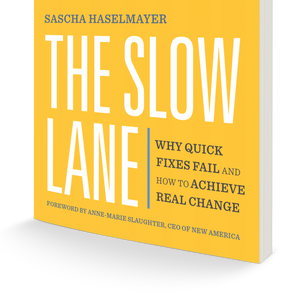We seem to be caught in a curious Catch-22 situation, when it comes to the question of who should be in charge. The Fast Lane tells us that those in power are in charge because they are the best. They are exceptionally skilled at channeling the complexity of the world into determined action. And come a crisis, you may well witness a hero or heroine at work.
“A hero (heroine in its feminine form) is a real person or a main fictional character who, in the face of danger, combats adversity through feats of ingenuity, courage, or strength.” (Wikipedia)
The Person Who Mistook Himself For A Hero
Yet, it is also true that we live in a world, where very few such leaders deliver. During the financial crisis of 2007-8, millions of people in Spain and Ireland suffered from the actions taken by their political leaders. Leaders in Ireland so believed in their super-powers, that they decided in a 6am cabinet conference call to completely bail out the banks, without any consultation.
When a crisis hits, many leaders believe that they have super-powers. And it isn't just political leaders who suffer this delusional hero complex. Mark Zuckerberg and Elon Musk, faced by crises at Facebook and Twitter, seem to be using the same playbook, wielding their power to place ever bigger and simplistic bets. What they all have in common, is that they shut out outside voices, and trust that their genius will save them. They are looking for a simple, big and liberating move that will get them out of trouble. Like bailing out the banks and cutting social services. Or going all in on the Metaverse. But the odds are stacked highly against them.
From Self-Proclaimed Genius To (Benign) Dictator
Part of the tyranny of merit is the misguided belief by those with wealth or privilege that they have earned their place. From here, it is a short step to believe in our genius and heroic ability to solve any problem better than anyone else. It is almost as if we are wired to take any sign of success as validation that we are better at finding the right answers. It feeds hubris, an excessive confidence in our abilities.
How we imagine great leadership matters. In a Fast Lane world, it is no coincidence that many people, when asked about a great leader, mention wartime leaders like Winston Churchill. They fit the template of the lone genius, carrying the burden of decisions for us all at times of great adversity. But isn't it this conception of greatness that fed the kind of poor decisions taken by leaders in Spain and Ireland, ruining the lives of millions (youth unemployment in Spain remains at 35%). It find it easy to imagine these prime ministers withdrawing from the public, trusting an inner circle of expert advisers, to come up with a plan. Hoping that one day history will see their 'decisive actions' as modern-day Churchills.
A Good Crisis Is No Excuse
In this context, what the idea of “not letting a good crisis go to waste” often means is: take the opportunity to get things done your way. To impose your answer on those around you, now weakened by crisis. It also propels the kind of candidates for leadership who promise quick fixes to complex problems.
The idea of “not letting a good crisis go to waste” often means is: take the opportunity to get things done your way.
If we are interested in what great leadership looks like, once we peel away the great drama, charisma, and grandeur of wartime, we can discover quite a different role model. Leaders in Iceland took a different course of action. Instead of rushing to bailing out the banks, they calculated the immense social cost this would incur. Their decision to let banks fail, and instead call a constitutional convention, wasn't that of a lone genius. In fact, it seems impossible to attribute these decisions to a single leader, despite the fact that it was Iceland's president, Ólafur Ragnar Grímsson, who refused to sign the bank bail-out plan into law. By the time he had to take a decision, activists and community organizers had mobilized more than 25% of Icelanders to sign a petition against the law that was firmly backed by politicians, trade unions, and industry lobbies. In the referendum, 98% of Icelanders voted against the bail-out plan.
Successful Slow Lane movements don't rely on heroic leaders who impose their answers, and yet, they achieve truly transformational social change. Instead of insisting on their genius to solve for others, they solve with. The critical difference between what happened in Iceland and Spain was that at a critical moment, in 2010, Iceland's president remained approachable ordinary citizens like the activists of InDefence, a movement petitioning against the proposed law. Imperfect as the arrangement was, it stopped the rush to action and leaders to see just how impactful the bail-out would be to the lives of ordinary Icelanders. Youth unemployment in Iceland peaked at 15% in 2010 and dropped to 6% by 2016. Spain's youth unemployment kept growing and peaked in 2014, at 55.5%, and remains excessively high.
The Beauty Of Stepping Out Of The Greatness
Personally, I find these smaller and somewhat imperfect stories of leadership more instructive than the grand biographies of historical leaders. As much as I admire the achievements of Nelson Mandela or Mahatma Gandhi, their stories are as firmly out of reach for me as the leadership lessons of Winston Churchill. Former UK Prime Minister Boris Johnson is famously a keen scholar of Winston Churchill. He also led what history may judge to be one of the country's least effective and manipulative governments.
What makes these stories smaller and imperfect (only in the sense of a Hollywood drama) is that with time, leaders step not into their greatness, but out of it. The more they engage in listening, in sharing power and letting others lead alongside them, the more they disappear into the background of what could otherwise become the traditional hero story. As they open up to new answers, their singular claim to genius gives way to collective intelligence. The role of these leaders simply changes, especially if they can withstand the delusion that they are geniuses. Some, for example, go on to embody the values and vision for change they helped instigate, continuing to be of service to their communities or building bridges to other parts of society.



